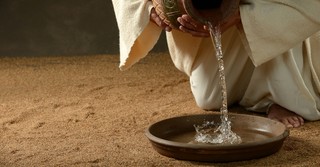- Recent Translations
- All Translations
Luke 7:37
Share
Settings
Luke 7:37 in Other Translations
Luke 7:37 Meaning and Commentary
And behold, a woman in the city
Not Mary Magdalene, spoken of in ( Luke 8:2 ) under another character; and is a different person, who had not been taken notice of by the evangelist before; nor Mary the sister of Lazarus, who is said to anoint the feet of Christ, and wipe them with her hair, ( John 12:3 ) . The character given of this woman, does not seem so well to agree with her; at least, the fact here recorded, cannot be the same with that; for this was in Galilee, and that in Bethany; this in the house of Simon the Pharisee, that in the house of Lazarus; this was some time before Christ's death, and after this he went a circuit through every city and village, that was but six days before his death, and after which he never went from those parts; nor is this account the same with the history, recorded in ( Matthew 26:6 Matthew 26:7 ) ( Mark 14:3 ) for that fact was done in Bethany also, this in Galilee; that in the house of Simon: the leper, this in the house of Simon the Pharisee; that was but two days before the death of Christ, this a considerable time before; the ointment that woman poured, was poured upon his head, this upon his feet: who this woman was, is not certain, nor in what city she dwelt; it seems to be the same in which the Pharisee's house was; and was no doubt one of the cities of Galilee, as Naim, Capernaum, or some other at no great distance from these:
which was a sinner;
a notorious sinner, one that was known by all to have been a person of a wicked, life and conversation; a lewd woman, a vile prostitute, an harlot, commonly reputed so: the Arabic word here used, signifies both a sinner and a whore F11; and so the word, sinners, seems to be used elsewhere by Luke; see ( Luke 15:1 Luke 15:2 ) compared with ( Matthew 21:31 Matthew 21:32 ) . Some think she was a Gentile, Gentiles being reckoned by the Jews sinners, and the worst of sinners; but this does not appear:
when she knew that Jesus sat at meat in the Pharisee's house;
having observed it herself, that he was invited by him, and went with him, or being informed of it by others,
brought an alabaster box of ointment:
ointment was used to be put in vessels made of "alabaster", which kept it pure and incorrupt; and this stone was found about Damascus, F12 so that there might be plenty of it in Judea; at least it might be easily had, and such boxes might be common; and as this woman appears to have been a lewd person, she might have this box of ointment by her to anoint herself with, that she might recommend herself to her gallants. The historian F13 reports, that
``Venus gave to Phaon an alabaster box with ointment, with which Phaon, being anointed, became the most beautiful of men, and the women of Mitylene were taken with the love of him.''If this box had been provided with such a view; it was now used to another and different purpose.
F11 Vid. Castell. Lex. Heptaglott. col. 1195.
F12 Plin. Nat. Hist. l. 36. c. 8.
F13 Aelian. var. Hist. l. 12. c. 8.
